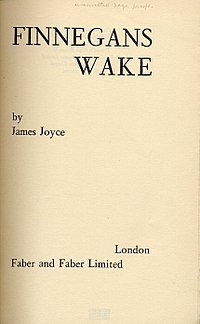Finnegans Wake
 |
|
| Author | James Joyce |
|---|---|
| Language | English |
| Genre | Sui generis |
| Publisher | Faber and Faber |
|
Publication date
|
4 May 1939 |
| OCLC | 42692059 |
| 823/.912 21 | |
| LC Class | PR6019.O9 F5 1999 |
| Preceded by | Ulysses (1922) |
Finnegans Wake is a work of comic fiction by Irish writer James Joyce. It is significant for its experimental style and reputation as one of the most difficult works of fiction in the English language. Written in Paris over a period of seventeen years, and published in 1939, two years before the author's death, Finnegans Wake was Joyce's final work. The entire book is written in a largely idiosyncratic language, consisting of a mixture of standard English lexical items and neologistic multilingual puns and portmanteau words, which many critics believe were attempts to recreate the experience of sleep and dreams. Owing to the work's expansive linguistic experiments, stream of consciousness writing style, literary allusions, free dream associations, and abandonment of narrative conventions, Finnegans Wake remains largely unread by the general public.
Despite the obstacles, readers and commentators have reached a broad consensus about the book's central cast of characters and, to a lesser degree, its plot, but key details remain elusive. The book discusses, in an unorthodox fashion, the Earwicker family, comprising the father HCE, the mother ALP, and their three children Shem the Penman, Shaun the Postman, and Issy. Following an unspecified rumour about HCE, the book, in a nonlinear dream narrative, follows his wife's attempts to exonerate him with a letter, his sons' struggle to replace him, Shaun's rise to prominence, and a final monologue by ALP at the break of dawn. The opening line of the book is a sentence fragment which continues from the book's unfinished closing line, making the work a never-ending cycle. Many noted Joycean scholars such as Samuel Beckett and Donald Phillip Verene link this cyclical structure to Giambattista Vico's seminal text La Scienza Nuova ("The New Science"), upon which they argue Finnegans Wake is structured.
...
Wikipedia
